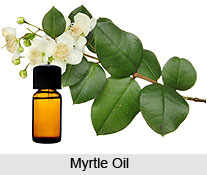 Myrtle is a medicinal herb that is used in traditional medicine in many parts of the world. Its berries, leaves and fruits have been used extensively as a traditional folk medicine for the treatment of disorders such as diarrhoea, peptic ulcer, haemorrhoids, inflammation, pulmonary and skin diseases. The oil from the lemon myrtle tree knocks out stubborn salmonella and staph organisms while providing a variety of cosmetic uses.
Myrtle is a medicinal herb that is used in traditional medicine in many parts of the world. Its berries, leaves and fruits have been used extensively as a traditional folk medicine for the treatment of disorders such as diarrhoea, peptic ulcer, haemorrhoids, inflammation, pulmonary and skin diseases. The oil from the lemon myrtle tree knocks out stubborn salmonella and staph organisms while providing a variety of cosmetic uses.
Origin of Myrtle Oil
It has small, shiny, dark green leaves which contain vesicles full of essential oil. The flowers are fragrant and white, five-petalled with a spectacular spray of thin stamens. These are followed by purple-black berries. In its natural habitat, myrtle can grow to virtual tree height, up to about 4 m.
Myrtle is a native shrub in the Middle East. It grows in all the countries that border the Mediterranean. Countries where myrtle is native include: Turkey, Morocco, Algeria, Tunisia, France, Spain, Greece, and Italy. It has been brought to southern Britain and southern France.
History of Myrtle Oil
The myrtle plant first appears in history in ancient Greece, and it was associated with Aphrodite, the Goddess of Love and Beauty. Furthermore, the bravest soldiers, athletes and nobles were honored with its leaves. It was also prized for its medicinal properties too.
Extraction of Myrtle Oil
Myrtle essential oil is obtained through the steam distillation of the myrtle plant"s flowers, leaves, and stem, which is called "Myrtus Communis" in the botanical world. The oil that is most commonly used medicinally is extracted from the leaves. The colour will range from clear to greenish-yellow to yellow or very light orange. Its aroma is reminiscent of frankincense or bay.
Health Benefits of Myrtle Oil
The health benefits of Myrtle Essential Oil can be attributed to its properties as an antiseptic, astringent, deodorant, expectorant, nervine, aphrodisiac, disinfectant and sedative substance.
1.Astringent: If used in mouthwash, myrtle essential oil makes the gums contract and strengthen their hold on the teeth. If ingested, it also makes the intestinal tracts and muscles contract. Furthermore, it contracts and tightens the skin and helps to diminish wrinkles. It can also help stop haemorrhaging by inducing the blood vessels to contract.
2.Deodorant: It can be used in incense sticks and burners, fumigants and vaporizers as room fresheners. It can also be used as a body deodorant or perfume.
3.Antiseptic: This oil is suitable to apply on wounds. It does not let microbes infect the wounds and thereby protects against sepsis and tetanus.
4.Expectorant: The oil reduces the presence and further deposition of phlegm. It also clears congestion of the nasal tracts, bronchi and lungs resulting from colds and provides good relief from coughing.
5.Nervine: It maintains the stability of the nerves and keeps one from becoming nervous or unnecessarily stressed over small issues. It is a beneficial agent against nervous and neurotic disorders like Alzheimer"s disease, Parkinson"s disease, shaking limbs, fear, vertigo, anxiety, and chronic stress.
6.Sedative: The oil relaxes and sedates. This property also provides relief from tension, stress, annoyance, anger, distress and depression, as well as from inflammation, irritation and various allergies.
7.Aphrodisiac: It works well to alleviate problems like impotency, frigidity, erectile dysfunctions, and loss of libido.
8.Disinfectant: Inhibits infections, since it is a bactericidal, germicidal, fungicidal and antiviral substance. It also helps to cure infections in the stomach and intestines, while helping to stop diarrhea.
Other Benefits: It can be used for skin care and against haemorrhoids, acne, pimples, cystitis, infections in the urinary tract, and chronic problems like leucorrhoea. Finally, it is effective against chest infections in both babies and the elderly.
Uses of Myrtle Oil
•Normalizes the functioning of the Thyroid and Ovaries.
•Kills salmonella on fruits and vegetables.
•Lowers blood sugar.
•Treats malaria.
•Acts as a mosquito repellant.
•Helps in combating addictions.
•Helpful in meditation.
Blending: Myrtle essential oil blends well with a wide range of essential oils such as Atlas, Benzoin, Bergamot, Elemi, Eucalyptus, Black Pepper, Cedar Wood, Frankincense, Myrrh, Neroli, Rose, Ho Wood, Hyssop, Jasmine, Lavender, Lemon, Lemongrass, Clary Sage, Coriander, Melissa, Rosewood and Ylang-Ylang oils.




